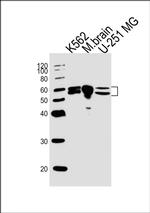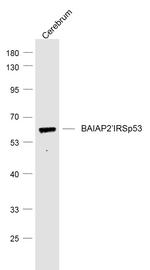Search Thermo Fisher Scientific
FIGURE: 1 / 2
BAIAP2 Antibody (BSM-51410M) in WB


Product Details
BSM-51410M
Species Reactivity
Host/Isotype
Class
Type
Clone
Immunogen
Conjugate
Form
Concentration
Purification
Storage buffer
Contains
Storage conditions
Shipping conditions
Target Information
The protein encoded by this gene has been identified as a brain-specific angiogenesis inhibitor (BAI1)-binding protein. This adaptor protein links membrane bound G-proteins to cytoplasmic effector proteins. This protein functions as an insulin receptor tyrosine kinase substrate and suggests a role for insulin in the central nervous system. It also associates with a downstream effector of Rho small G proteins, which is associated with the formation of stress fibers and cytokinesis. This protein is involved in lamellipodia and filopodia formation in motile cells and may affect neuronal growth-cone guidance. This protein has also been identified as interacting with the dentatorubral-pallidoluysian atrophy gene, which is associated with an autosomal dominant neurodegenerative disease. Alternative splicing results in multiple transcript variants encoding distinct isoforms.
For Research Use Only. Not for use in diagnostic procedures. Not for resale without express authorization.
References (0)
Bioinformatics
Protein Aliases: BAI-associated protein 2; BAI1-associated protein 2; BAR/IMD domain-containing adapter protein 2; Brain-specific angiogenesis inhibitor 1-associated protein 2; Fas ligand-associated factor 3; FLAF3; insulin receptor substrate of 53 kDa; insulin receptor substrate p53; Insulin receptor substrate p53/p58; Insulin receptor substrate protein of 53 kDa; Insulin receptor tyrosine kinase 53 kDa substrate; IRS-58; IRSp53; IRSp53/58
Gene Aliases: BAIAP2; BAP2; FLAF3; IRSP53; R75030
UniProt ID: (Human) Q9UQB8, (Mouse) Q8BKX1
Entrez Gene ID: (Human) 10458, (Mouse) 108100

Performance Guarantee
If an Invitrogen™ antibody doesn't perform as described on our website or datasheet,we'll replace the product at no cost to you, or provide you with a credit for a future purchase.*
Learn more
We're here to help
Get expert recommendations for common problems or connect directly with an on staff expert for technical assistance related to applications, equipment and general product use.
Contact tech support
